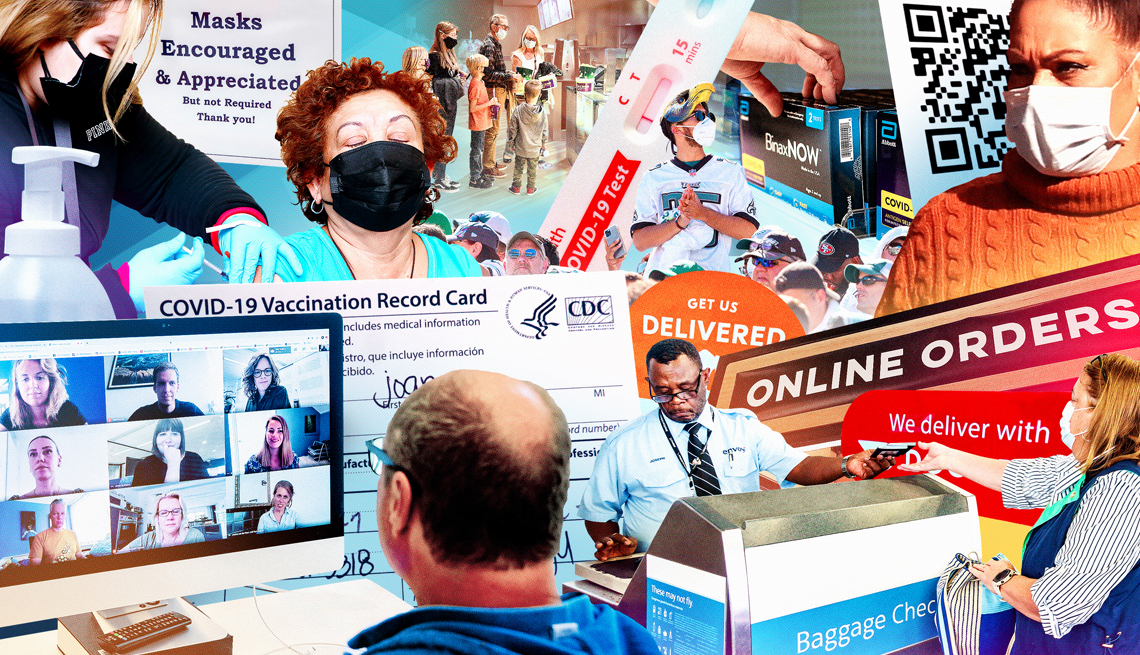
Three years in, how the pandemic has changed our lives (and how it hasn’t)
- Select a language for the TTS:
- UK English Female
- UK English Male
- US English Female
- US English Male
- Australian Female
- Australian Male
- Language selected: (auto detect) - EN
Play all audios:

WHAT DOES A FUTURE WITH COVID LOOK LIKE? We asked 3 experts for their takes on coexisting with the ever-evolving virus _By Leslie Goldman_ DO YOU THINK COVID-19 WILL BE WITH US FOREVER, LIKE
THE FLU? _Monica Gandhi, M.D., associate division chief of the division of HIV, Infectious Diseases and Global Medicine, UCSF/San Francisco General Hospital_: Yes. The fact that COVID can
be spread before a person is symptomatic, lacks clear distinguishing symptoms and is carried by animals (nearly 30 species) all make it essentially impossible to eliminate. Vaccines are
excellent at protecting against severe disease, but they won’t make this virus go away. WILL COVID ALWAYS BE MORE DANGEROUS THAN THE FLU OR THE COMMON COLD? _Gandhi:_ I don’t think so. We
rarely admit people — including older people — to the ICU with COVID or COVID-related pneumonia anymore. That’s thanks to widespread immunity (more than 95 percent of Americans have
antibodies, a result of vaccination, natural immunity or both); good inpatient and outpatient treatments like remdesivir and Paxlovid, respectively; and the fact that the omicron variant and
its subvariants are less likely than earlier strains to infect lung cells. WILL GETTING THE CURRENT BOOSTER HELP ME AT ALL IF I COME INTO CONTACT WITH NEW VARIANTS? _Eran Metzger, M.D.,
director of psychiatry, Hebrew SeniorLife, Boston_: Yes. It may not keep you from contracting COVID altogether, but it can help prevent severe illness. Like an annual flu vaccination, these
boosters are tailored to the new strains but boost your immunity to the virus in general. WILL THERE EVENTUALLY BE AN ANNUAL VACCINE, LIKE THERE IS FOR THE FLU? _Gandhi_: If COVID-19
settles into more of a winter respiratory virus — and I think it will — a yearly booster for people age 65 and up will eventually be recommended to maintain strong immunity and stay in the
lower range of danger. Vaccination is particularly important for older individuals with comorbidities like heart disease or emphysema. MANY PEOPLE ARE CONFUSED ABOUT PAXLOVID. MUST YOU BE
VERY ILL TO TAKE IT? _Emily Landon, M.D., medical specialist for the High-Consequence Pathogen Preparedness Program, University of Chicago Medicine_: Anyone over 50 with COVID should
absolutely take it, regardless of how ill they feel. Paxlovid acts like a cleanup crew, clearing away some of the virus so your immune system has an easier job. That means less risk of
becoming very sick. And preliminary evidence suggests it may help reduce the risk of long COVID. The earlier you take Paxlovid after becoming sick, the faster and better it works. Make sure
your prescribing physician is aware of any other medications you take, as it can interact with some drugs, such as statins. WHAT IS YOUR ADVICE TO OLDER ADULTS REGARDING MASKS? _Landon_:
With mandates lifted, masking is now a very personal decision. There are still excellent reasons to try to avoid COVID, including the fact that we’re just beginning to understand the
long-term consequences of having it. Ask yourself, “Is skipping the mask in a certain environment worth getting COVID?” In some cases, like a granddaughter’s wedding, you might say yes,
enjoying the celebration mask-free feels like an acceptable trade-off. And if you are vaccinated, boosted and have no underlying conditions, your risk of ending up with severe illness is
low. In other instances, like grocery shopping, you might say no. Personally, I consider masking nonnegotiable anytime you’ve got many people packed into confined spaces, such as airports,
airplanes, buses or the gym. Research shows nearly 100 percent of planes have COVID in their wastewater after any given flight, which means at least one person on the plane is
COVID-positive. My mom is 76 and still masks on planes and at church, but not when golfing or meeting friends outdoors. Basically, any time you spend masked reduces your risk. But it must be
a well-fitting N95, KN95 or KF94 mask; fabric masks don’t really help. MY LOVED ONE LIVES IN A LONG-TERM CARE FACILITY WITH FREQUENT COVID OUTBREAKS. WILL I EVER BE ABLE TO VISIT THEM
SAFELY? _Metzger_: When the pandemic started, long-term care settings like nursing homes went on strict lockdown. We’re now seeing lasting health effects caused by such draconian isolation:
depression, post-traumatic stress disorder. Some doctors collectively refer to these as “the second pandemic.” That, combined with high vaccination rates, has resulted in many nursing homes
becoming more flexible about visitation. We also know that loneliness is a risk factor for many chronic conditions, including depression, dementia and heart disease. So, visiting your loved
one with precautions in place, such as vaccinations and masks, may not only be possible but also beneficial. Ask if there is a COVID-free area where you can visit, such as a private family
room. If you won’t encounter staff or residents on the unit with COVID, the risk is minimal.
